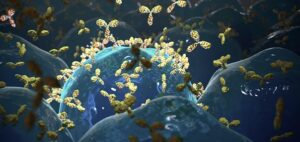Cold agglutinin disease is a rare autoimmune hemolytic anemia that affects 12 per million individuals and is caused by IgM autoantibodies binding to erythrocytes at colder temperatures, which result in agglutination. Although no approved therapies exist, the monoclonal antibody rituximab is effective in about 50% of cases. Relapses, however, are common, and blood transfusion and plasma exchange therapy are often used. In order to determine if sutimlimab, a new monoclonal antibody that targets the C1s protein responsible for activating the classical complement cascade, is an effective treatment, 24 patients received at least one dose of sutimlimab and were followed for 26 weeks. Over half of the patients (13/24; 54%) had normalized hemoglobin levels of at least 12 g/dL or had hemoglobin levels increase at least 2 g/dL from baseline, without transfusions or other medications. In addition, bilirubin levels normalized by week three, the majority (71%) of patients did not need transfusions after week five, and reductions in fatigue were concurrent with inhibition of the classical complement pathway. Furthermore, no serious adverse events were linked to sutimlimab. Inhibition of the classical complement pathway may be an effective treatment for cold agglutinin disease, but a longer follow-up period is needed.
Reference:

